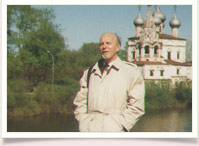|
Chamber choir "Gaudeamus"
 Gaudeamus, the chamber choir of the Moscow Bauman State Technical University, with a vast repertoire and long-standing, cherished traditions, has existed for more than 30 years, and is well-known in Russia--especially in its native Moscow, where it has appeared in the major concert halls, but also throughout the former USSR, and in other countries where it has performed on tours.
Gaudeamus, the chamber choir of the Moscow Bauman State Technical University, with a vast repertoire and long-standing, cherished traditions, has existed for more than 30 years, and is well-known in Russia--especially in its native Moscow, where it has appeared in the major concert halls, but also throughout the former USSR, and in other countries where it has performed on tours.
Gaudeamus consists mostly of students of the BMSTU and other Moscow institutes of higher education, and includes up to 40 members. Its name was taken from opening words of the medieval student song ?Gaudeamus igitur, juvenes dum sumus...?--?Let?s be merry, while we are young...? The choir members have always followed the injunction, the witness of their outstanding out-of-choir pursuits you can see in the section 'Photos' below.. There is even a special ensemble ?Bel Canto? within the choir, and a number of poets and composers.
The choir was created and has been led by Vladimir Zhivov, a well-known choir conductor and professor of choir conducting. It is his leadership that has brought Gaudeamus to its present level of excellence as he is responsible not only for its outstanding ensemble but for selecting its repertoire and arrangements of traditional folk songs.
Repertoire
Gaudeamus performs music of different epochs and styles for mixed a capella choir by both Russian and western composers, ranging from folk songs and American spirituals to Renaissance motets.
Particular attention is paid to Russian Orthodox sacred music. Not long ago Gaudeamus was awarded a laureate in a competition at the festival of Russian Orthodox music ?Yalta-Victoria 2000? in the Crimea for the finest performance of ?Our Father? by Stravinsky. Gaudeamus also performs music by such masters of sacred music as Berezovsky, Bortniansky, Tchesnokov, and Archangelsky.
Audiences have particularly appreciated Gaudeamus? performances of pieces by Georgii Sviridov from the cycle ?A Wreath by Pushkin?, and by Valery Gavrilin from the cycle ?Peals?. Special interest attaches to its interpretation of ?Winter Way? by Vissarion Shebalin (on a Pushkin text), Gaudeamus being the only choir which performs this piece uncut, thanks to Dr. Zhivov?s work in the Shebalin archives. ?The Lake? and ?The Unknown Girl? are also very popular.
However, Gaudeamus performs much music which requires a very refined, elegant, or instrumental sound. These include some pieces by western composers, ancient madrigals, polyphonic music by Sergey Taneev and similar works. Dr. Zhivov regularly adds interesting new music to its repertoire, among the latest being the Argentine Tango ?Verano Porteno? by Astor Pizzolla.
Recordings
Gaudeamus igitur medieval students' song
The Unknown Girl (Falik-Blok)
The Lake (Partskhaladze-Kupatashvili)
Tanya-Tanyusha (Russian folk song)
The Cloud (Tchaikovsky-Lermontov)
The Evening (Taneev-Polonsky)
Madrigal "O, che splendor" (Palestrina)
Motet "Christus factus est pro nobis" (Felice Anerio)
Orthodox sacred music:
Do not reject me in the time of old age (Berezovsky)
Lord, tell me the date of my death (Bortnyansky)
I think of Judgement Day (Arkhangelsky)
Praise (Khristoff)
Lord, my Lord (Degtyarev)
The Great Glorification (Strumsky)
Rejoice Mary (Rachmaninoff)
Vladimir Zhivov, Artistic Director
 Dr. Zhivov, born in 1938, and a 1963 graduate of the Moscow Tchaikovsky Conservatory, has been working with amateur and professional choirs for more than 40 years.
Dr. Zhivov, born in 1938, and a 1963 graduate of the Moscow Tchaikovsky Conservatory, has been working with amateur and professional choirs for more than 40 years.
1963-1965 ? choirmaster and conductor of a choir-dance ensemble in Hungary
1965-1976 ? choirmaster and conductor of the State Moscow Choir
1968-present ? artistic director and main conductor of Gaudeamus
Since 1965 Dr. Zhivov has also been a member of the musical faculty of the Moscow Pedagogical University, and from 1975 to 1986, of the choral-conducting faculty of the Moscow Conservatory. As head of the choir department of Moscow Musical Society and organizer of the festival ?Moscow Choir Autumn,? he is regularly invited to sit on the juries of all-Russian and international competitions and festivals. Dr. Zhivov is the author of more than 150 publications, including several books, the most recent being ?The Art of Choir Performance?
History
Vladimir Zhivov first acquainted with the Moscow State Technical University in 1961, as a replacement for the choral director Boris Dunayevsky, brother of famous Russian composer. Dr. Zhivov was then still a student at the Moscow Conservatory. After graduation he worked in Hungary. Gaudeamus? roots can be traced back to Russia in 1968, to student vocal ensembles named, for instance, ?Dreamers? or ?Romantics,? which gradually united in a group simply called ?Choir Ensemble?. This choir received its first prize in 1972 at the All-Union Festival of student ensembles. It took the name ?Gaudeamus? in 1976 when it was invited to give a solo philharmonic concert in the Riga Dom Concert Hall, an opportunity seldom given even to professionals. Since then it has performed all over the Soviet Union. In 1981 it received first prize at the international choir competition in Budapest, and in 1982 a ?Lenin?s Komsomol? prize. In 1983 Melodiya, the recording company of the USSR, issued Gaudeamus? first recording. In 1988 the choir won the international competition in Slovakia. Newspapers and magazines have published articles about Gaudeamus. Its recordings are broadcast on radio and television, and it has performed on tour in Poland, Bulgaria, Hungary, Slovakia, Germany, the Netherlands, Spain, and Italy.
|